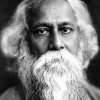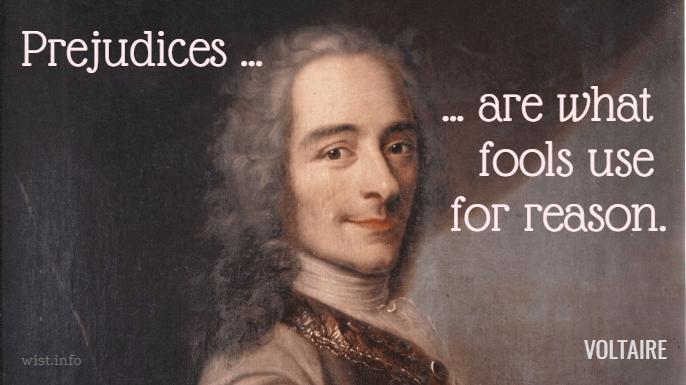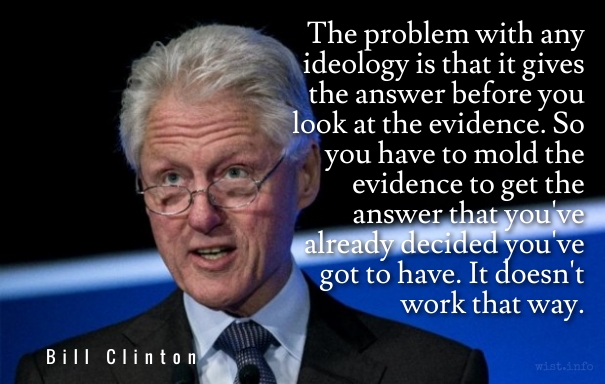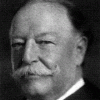Quotations about:
bias
Note not all quotations have been tagged, so Search may find additional quotes on this topic.
Once a man’s understanding has settled on something (either because it is an accepted belief or because it pleases him), it draws everything else also to support and agree with it. And if it encounters a larger number of more powerful countervailing examples, it either fails to notice them, or disregards them, or makes fine distinctions to dismiss and reject them, and all of this with much dangerous prejudice, to preserve the authority of its first conceptions.
[Intellectus humanus in iis quae semel placuerunt (aut quia recepta sunt et credita, aut quia delectant), alia etiam omnia trahit ad suffragationem et consensum cum illis: et licet major sit instantiarum vis et copia, quae occurrunt in contrarium; tamen eas aut non observat, aut contemnit, aut distinguendo summovet et rejicit, non sine magno et pernicioso praejudicio, quo prioribus illis syllepsibus authoritas maneat inviolata.]
Francis Bacon (1561-1626) English philosopher, scientist, author, statesman
Instauratio Magna [The Great Instauration], Part 2 “Novum Organum [The New Organon],” Book 1, Aphorism # 46 (1620) [tr. Silverthorne (2000)]
(Source)
(Source (Latin)). Alternate translations:
The human understanding, when any preposition has been once laid down, (either from general admission and belief, or from the pleasure it affords,) forces every thing else to add fresh support and confirmation; and although more cogent and abundant instances may exist to the contrary, yet either does not observe or despises them, or gets rid of and rejects them by some distinction, with violent and injurious prejudice, rather than sacrifice the authority of its first conclusions.
[tr. Wood (1831)]
The human understanding when it has once adopted an opinion (either as being the received opinion or as being agreeable to itself) draws all things else to support and agree with it. And though there be a greater number and weight of instances to be found on the other side, yet these it either neglects and despises, or else by some distinction sets aside and rejects; in order that by this great and pernicious predetermination the authority of its former conclusions may remain inviolate.
[tr. Spedding (1858)]
The human Intellect, in those things which have once pleased it (either because they are generally received and believed, or because they suit the taste), brings everything else to support and agree with them; and though the weight and number of contradictory instances be superior, still it either overlooks or despises them, or gets rid of them by creating distinctions, not without great and in jurious prejudice, that the authority of these previous conclusions may be maintained inviolate.
[tr. Johnson (1859)]
Once a human intellect has adopted an opinion (either as something it likes or as something generally accepted), it draws everything else in to confirm and support it. Even if there are more and stronger instances against it than there are in its favour·, the intellect either overlooks these or treats them as negligible or does some line-drawing that lets it shift them out of the way and reject them. This involves a great and pernicious prejudgment by means of which the intellect’s former conclusions remain inviolate.
[tr. Bennett (2017)]
The worst of superstitions is, to think
Your own to be the most endurable.
[…] Yours, the only one,
to which dim-sighted mankind may be trusted,
Till they can bear the brighter light of truth.[Der Aberglauben schlimmster ist, den seinen
Für den erträglichern zu halten […] dem allein
Die blöde Menschheit zu vertrauen, bis
Sie hellern Wahrheitstag gewöhne.]Gotthold Lessing (1729-1781) German playwright, philosopher, dramaturg, writer
Nathan the Wise [Nathan der Weise], Act 4, sc. 4 [Templar] (1779) [tr. Reich (1860)]
(Source)
Some of the translations leave out the second part.
(Source (German)). Alternate translations:
The worst of superstitions is to think
One's own most bearable.
[tr. Taylor (1790)]
That superstition is the worst of all
Which thinks itself the easiest to be borne --
[...] And to trust
To it alone a blind humanity
Till it is used to truth's more brilliant light.
[tr. Boylan (1878)]
The very worst
Of superstitions is, to hold one's own
The most endurable [...]
That only to entrust
Purblind humanity, till it learn to bear
The light of truth's clear day.
[tr. Corbett (1883)]
The worst of superstitions is, to think
One's own the most supportable. [...]
To it alone trust simple human-kind
Until to truth's bright rays it grows accustomed.
[tr. Jacks (1894)]
The worst of superstitions is to deem
Our special chains the most endurable --
[...] And to these alone
To trust purblind humanity until
Its eye can bear the brilliant noon of truth.
[tr. Maxwell (1917)]
The worst superstition is to consider one's own superstition the more tolerable one [...] to which alone to entrust weak-minded mankind until it will grow used to the brighter light of truth.
[tr. Reinhardt (1950)]
That superstition
Is worst which takes itself to be of all
The most endurable [...] and to which alone one may
Entrust dull-witted humankind, till it's
Accustomed to the brighter light of truth.
[tr. Morgan (1955)]
The most bigoted of superstitions is to hold one's own faith to be the only right one [...] which poor, blind men must trust until they see the light.
[tr. Ade (1972)]
We may fondly imagine that we are impartial seekers after truth, but with a few exceptions, to which I know that I do not belong, we are influenced, and sometimes strongly, by our personal bias; and we give our best thoughts to those ideas which we have to defend.
Nevertheless, we should of course all do our best to avoid controversy, in the sense that we should take every possible care to verify our facts and substantiate our conclusions before we publish our results.
August Krogh (1874-1949) Danish zoophysiologist, academic
“The Progress of Physiology,” Speech, International Congress of Physiological Sciences, Harvard University (1929-08-19)
(Source)
Reprinted in Science (1929-08-30). Quoted in Bodil Schmidt-Nielsen, August and Marie Krogh: Lives in Science, ch. 9 (1995).
Since I do not admit that a person without bias exists, I think the best that can be done with a large-scale history is to admit one’s bias and for dissatisfied readers to look for other writers to express an opposite bias. Which bias is nearer to the truth must be left to posterity.
Bertrand Russell (1872-1970) English mathematician and philosopher
Autobiography, ch. 13 (1968)
(Source)
If all the People of different Opinions in this Province would engage to give me as much for not printing things they don’t like, as I can get by printing them, I should probably live a very easy Life; and if all Printers were every where so dealt by, there would be very little printed.
Benjamin Franklin (1706-1790) American statesman, scientist, philosopher, aphorist
“Apology for Printers,” Philadelphia Gazette (1731-06-10)
(Source)
To my mind, a man without a bias cannot write interesting history — if, indeed, such a man exists. I regard it as mere humbug to pretend to a lack of bias.
Bertrand Russell (1872-1970) English mathematician and philosopher
Autobiography, ch. 13 (1968)
(Source)
There is no neutrality. There is only greater or less awareness of one’s bias.
Phyllis Rose (b. 1942) American literary critic, essayist, biographer, educator
“Fact and Fiction in Biography,” Writing of Women: Essays in a Renaissance (1985)
(Source)
It is assumed that the skeptic has no bias; whereas he has a very obvious bias in favor of skepticism.
Gilbert Keith Chesterton (1874-1936) English journalist and writer
“The Error of Impartiality,” All Things Considered (1908)
(Source)
Narrow-mindedness: allowing one’s prejudices to become convictions.
Marcelene Cox (1900-1998) American writer, columnist, aphorist
“Ask Any Woman” column, Ladies’ Home Journal (1944-06)
(Source)
The truth is sometimes seen, but rarely heard: on the fewest of occasions does it arrive in its elemental purity, especially if it has travelled far, for then it is always soiled by what has happened on the road: for feeling tinges with her colors all that she touches, sometimes happily, sometimes unhappily: she always leaves some kind of mark.
[La verdad ordinariamente se ve, extravagantemente se oye; raras veces llega en su elemento puro, y menos cuando viene de lejos; siempre trae algo de mixta, de los afectos por donde pasa; tiñe de sus colores la pasión cuanto toca, ya odiosa, ya favorable. Tira siempre a impresionar.]
Baltasar Gracián y Morales (1601-1658) Spanish Jesuit priest, writer, philosopher
The Art of Worldly Wisdom [Oráculo Manual y Arte de Prudencia], § 80 (1647) [tr. Fischer (1937)]
(Source)
(Source (Spanish)). Alternate translation:
Commonly truth is seen, but it is extraordinary to hear it. It seldom comes pure to our ears, especially when it come from a far. For then it takes some tincture of the passions that it meets by the way. It pleases or displeases, according to the colours that passion or interest give it, which aim always at prepossessing.
[Flesher ed. (1685)]
The truth is generally seen, rarely heard; seldom she comes in elemental purity, especially from afar; there is always some admixture of the moods of those through whom she has passed. The passions tinge her with their colors wherever they touch her, sometimes favorably, sometimes the reverse.
[tr. Jacobs (1892)]
Truth is more often seen than heard. Seldom does it reach us unalloyed, even less so when it comes from afar. It is always blended with the emotions it has passed through. Emotion taints everything it touches, making it odious or favorable. It tries always to impress us one way or another.
[tr. Maurer (1992)]
By Hercules, I prefer to be wrong with Plato … than to be right with those idiots.
[Errare mehercule malo cum Platone … quam cum istis vera sentire.]
Marcus Tullius Cicero (106-43 BC) Roman orator, statesman, philosopher
Tusculan Disputations [Tusculanae Disputationes], Book 1, ch. 17 (1.17) / sec. 39 [Auditor] (45 BC) [tr. @sententiq (2012)]
(Source)
Original Latin. Alternate translations:
- "Had rather, I assure you, be mistaken with Plato ... than to be of their opinion in the right." [tr. Wase (1643)]
- "I had rather, so help me Hercules, be mistaken with Plato ... than be in the right with them." [tr. Main (1824)]
- "I would rather err, by Hercules, with Plato ... than to embrace the truth with those others." [tr. Otis (1839)]
- "I had rather, so help me Hercules! be mistaken with Plato ... than be in the right with those others." [tr. Yonge (1853)]
- "I would rather, by Hercules, err with Plato ... than hold the truth with those other philosophers." [tr. Peabody (1886)]
- "I would rather, so help me Hercules! be wrong with Plato ... than be right with all the rest of them." [tr. Black (1889)]
- "Believe me, I'd rather go wrong in the company of Plato ... than hold the right views with his opponents." [tr. Davie (2017)]
I think one must engage in politics — using the word in a wide sense — and that one must have preferences: that is, one must recognise that some causes are objectively better than others, even if they are advanced by equally bad means. As for the nationalistic loves and hatreds that I have spoken of, they are part of the make-up of most of us, whether we like it or not. Whether it is possible to get rid of them I do not know, but I do believe that it is possible to struggle against them, and that this is essentially a moral effort. It is a question first of all of discovering what one really is, what one’s own feelings really are, and then of making allowance for the inevitable bias.
George Orwell (1903-1950) English writer [pseud. of Eric Arthur Blair]
“Notes on Nationalism” (May 1945)
(Source)
Anti-Catholicism has always been the pornography of the Puritan. Whereas the anti-Masons had envisaged drinking bouts and had entertained themselves with sado-masochistic fantasies about the actual enforcement of grisly Masonic oaths, the anti-Catholics invented an immense lore about libertine priests, the confessional as an opportunity for seduction, licentious convents and monasteries.
Ignorance iz the wet nuss of prejudice.
[Ignorance is the wet nurse of prejudice.]
Josh Billings (1818-1885) American humorist, aphorist [pseud. of Henry Wheeler Shaw]
Everybody’s Friend, Or; Josh Billing’s Encyclopedia and Proverbial Philosophy of Wit and Humor, ch. 130 “Affurisms: Puddin & Milk” (1874)
(Source)
Bigotry tries to keep truth safe in its hand
With a grip that kills it.Rabindranath Tagore (1861-1941) Indian Bengali poet, philosopher [a.k.a. Rabi Thakur, Kabiguru]
Fireflies (1928)
(Source)
And I have no desire to get ugly,
But I cannot help mentioning that the door of a bigoted mind opens outwards so that the only result of the pressure of facts upon it is to close it more snugly.
Ogden Nash (1902-1971) American poet
“Seeing Eye to Eye is Believing,” Good Intentions (1942)
(Source)
No man holding a strong belief on one side of a question, or even wishing to hold a belief on one side, can investigate it with such fairness and completeness as if he were really in doubt and unbiased; so that the existence of a belief not founded on fair inquiry unfits a man for the performance of this necessary duty.
William Kingdon Clifford (1845-1879) English mathematician and philosopher
“The Ethics of Belief,” Part 1 “The Duty of Inquiry,” Contemporary Review (Jan 1877)
(Source)
Prejudices, it is well known, are most difficult to eradicate from the heart whose soil has never been loosened or fertilized by education; they grow there, firm as weeds among stones.
Charlotte Brontë (1816-1855) British novelist [pseud. Currer Bell]
Jane Eyre, ch. 29 (1847)
(Source)
And therefore it was a good answer that was made by one who when they showed him hanging in a temple a picture of those who had paid their vows as having escaped shipwreck, and would have him say whether he did not now acknowledge the power of the gods, — “Aye,” asked he again, “but where are they painted that were drowned after their vows?”
[Taque recte respondit ille, qui, cum suspensa tabula in templo ei monstraretur eorum qui vota solverant, quod naufragii periculo elapsi sint, atque interrogando premeretur, anne tum quidem Deorum numen agnosceret, quaesivit denuo, At ubi sunt illi depicti qui post vota nuncupata perierint?]
Francis Bacon (1561-1626) English philosopher, scientist, author, statesman
Instauratio Magna [The Great Instauration], Part 2 “Novum Organum [The New Organon],” Book 1, Aphorism # 46 (1620) [tr. Spedding (1858)]
(Source)
The reference is to Diagoras, in Cicero, De Natura Deorum, 3.37, or to Diogenes the Cynic, in Diogenes Laertius, Lives of Eminent Philosophers, 6.59.
(Source (Latin)). Alternate translations:
It was well answered by him who was shown in a temple the votive tablets suspended by such as had escaped the peril of shipwreck, and was pressed as to whether he would then recognise the power of the gods, by an inquiry; "But where are the portraits of those who have perished in spite of their vows?"
[tr. Wood (1831)]
And so he made a good answer, who, when he was shown, hung up in the temple, the votive tablets of those who had fulfilled their vows after escaping from shipwreck, and was pressed with the question, "Did he not then recognize the will of the gods?" asked, in his turn, "But where are the pictures of those who have perished, notwithstanding their vows?"
[tr. Johnson (1859)]
So when someone was shown a votive tablet in a temple dedicated, in fulfilment of a vow, by some men who had escaped the danger of shipwreck, and was pressed to say whether he would now recognise the divinity of the gods, he made a good reply, when he retorted: "Where are the offerings of those who made vows and perished?"
[tr. Silverthorne (2000)]
A man was shown a picture, hanging in a temple, of people who had made their vows and escaped shipwreck, and was asked ‘Now do you admit the power of the gods?’ He answered with a question: ‘Where are the pictures of those who made their vows and then drowned?’ It was a good answer!
[tr. Bennett (2017)]
But the problem with any ideology is that it gives the answer before you look at the evidence. So you have to mold the evidence to get the answer that you’ve already decided you’ve got to have. It doesn’t work that way.
What are the marks of a sick culture? It is a bad sign when the people of a country stop identifying themselves with the country and start identifying with a group. A racial group. Or a religion. Or a language. Anything, as long as it isn’t the whole population. A very bad sign. Particularism. It was once considered a Spanish vice but any country can fall sick with it.
Everyone is prejudiced in favor his own powers of discernment, and will always find an argument most convincing if it leads to the conclusion he has reached for himself; everyone must then be given something he can grasp and recognize as his own idea.
There is nothing so despicable as a secret society that is based upon religious prejudice and that will attempt to defeat a man because of his religious beliefs. Such a society is like a cockroach — it thrives in the dark. So do those who combine for such an end.
Earthly minds, like mud walls, resist the strongest batteries: and though, perhaps, sometimes the force of a clear argument may make some impression, yet they nevertheless stand firm, and keep out the enemy, truth, that would captivate or disturb them. Tell a man passionately in love that he is jilted; bring a score of witnesses of the falsehood of his mistress, it is ten to one but three kind words of hers shall invalidate all their testimonies.
Personally, I hate to have to think of any man as of a definite race, creed, or color; so few men are really worth knowing that it seems a shameful waste to let an anthropoid prejudice stand in the way of free association with one who is.
It is difficult for a majority to see, let alone sympathize with, a practice that discriminates against a minority. It’s not unlike trying to get a fish to understand the concept of water! It is simply the medium in which the fish resides, requiring no cognition of the water that supports it. Discrimination — not just individual, but systemic — is the “water” in which the majority swims, and unless something happens to bring that discrimination into the view and consciousness of the majority, nothing will change, because the majority hardly, if ever, notices it.
Never believe in a meritocracy in which no one is funny-looking.
Teresa Nielsen Hayden (b. 1956) American editor, writer, essayist
Making Light, “Commonplaces”
(Source)
If you mean to make your side of the argument appear plausible, do not prejudice the people against what you think truth by your passionate manner of defending it.
James Burgh (1714-1775) British politician and writer
The Dignity of Human Nature, Sec. 5 “Miscellaneous Thoughts on Prudence in Conversation” (1754)
(Source)
Prejudice, not being founded on reason, cannot be removed by argument.
Samuel Johnson (1709-1784) English writer, lexicographer, critic
(Spurious)
(Source)
Frequently attributed without citation, and not found in Johnson's works. However, the phrase can be found in other contexts:
- "This objection on the score of color is founded upon prejudice, and hence cannot be removed by argument, for prejudice is blind and listens not to reason." -- Rep. Godlove S. Orth of Indiana, speech before the House of Representatives (5 Apr 1869) on the question of admitting the Dominican Republic as a US territory.
- "This persuasion of the power of the priest is, as we have said, a traditional prejudice; it is not founded on any reasons or proofs addressed to the understanding, and therefore it cannot be removed by argument." -- John Eliot Howard, The Island of the Saints (1855), quoting from the Achill Herald (Jun 1855).
Your assumptions are your windows on the world. Scrub them off every once in a while, or the light won’t come in. If you challenge your own, you won’t be so quick to accept the unchallenged assumptions of others. You’ll be a lot less likely to be caught up in bias or prejudice or be influenced by people who ask you to hand over your brains, your soul, or your money because they have everything all figured out for you.
Alan Alda (b. 1936) American actor [b. Alphonso Joseph D'Abruzzo]
Things I Overheard While Talking to Myself, ch. 2 “Lingering at the Door” (2007)
(Source)
Originally given at the commencement speech at Connecticut College in May, 1980, where his daughter Eve was graduating.
I am quite sure that (bar one) I have no race prejudice, and I think I have no color prejudices, nor caste prejudices. Indeed, I know it. I can stand any society. All I care to know is that a man is a human being — that is enough for me; he can’t be any worse.
We usually see only the things we are looking for — so much so that we sometimes see them where they are not.
Eric Hoffer (1902-1983) American writer, philosopher, longshoreman
The Passionate State of Mind, Aphorism 238 (1955)
(Source)
The judgments which Johnson passed on books were, in his own time, regarded with superstitious veneration, and, in our time, are generally treated with indiscriminate contempt. They are the judgments of a strong but enslaved understanding. The mind of the critic was hedged round by an uninterrupted fence of prejudices and superstitions. Within his narrow limits, he displayed a vigour and an activity which ought to have enabled him to clear the barrier that confined him. How it chanced that a man who reasoned on his premises so ably, should assume his premises so foolishly, is one of the great mysteries of human nature.
Thomas Babington Macaulay (1800-1859) English writer and politician
“Samuel Johnson,” The Edinburgh Review (Sep 1831)
(Source)
Review of John Croker's 1831 edition of James Boswell, The Life of Samuel Johnson.
Everybody wrings their hands about Fox News. You know, “fair and balanced? Why, that’s snide!” Yeah, okay, maybe they’re not fair and balanced, but CNN used to have the slogan “You Can Depend on CNN”. Guess what? I watch it, no you can’t. So what’s the difference?
Science is a way of trying not to fool yourself. The first principle is that you must not fool yourself, and you are the easiest person to fool.
Don’t dismiss a good idea simply because you don’t like the source.
H. Jackson "Jack" Brown, Jr. (b. 1940) American writer
Life’s Little Instruction Book, Vol. 2, #691 (1994)
(Source)
Faced with the choice between changing one’s mind and proving there is no need to do so, almost everyone gets busy on the proof.
John Kenneth Galbraith (1908-2006) Canadian-American economist, diplomat, author
Economics, Peace and Laughter (1971)
(Source)
(also called "Galbraith's Law")
Man prefers to believe what he wants to be true. He rejects what is difficult because he is too impatient to make the investigation; he rejects sensible ideas, because they limit his hopes; he rejects the deeper truths of nature because of superstition; he rejects the light of experience, because he is arrogant and fastidious, believing that the mind should not be seen to be spending its time on mean, unstable things; and he rejects anything unorthodox because of common opinion. In short, emotion marks and stains the understanding in countless ways which are sometimes impossible to perceive.
[Quod enim mavult homo verum esse, id potius credit. Rejicit itaque difficilia, ob inquirendi impatientiam; sobria, quia coarctant spem; altiora naturae, propter superstitionem; lumen experientiae, propter arrogantiam et fastum, ne videatur mens versari in vilibus et fluxis; paradoxa, propter opinionem vulgi; denique innumeris modis, iisque interdum imperceptibilibus, affectus intellectum imbuit et inficit.]
Francis Bacon (1561-1626) English philosopher, scientist, author, statesman
Instauratio Magna [The Great Instauration], Part 2 “Novum Organum [The New Organon],” Book 1, Aphorism # 49 (1620) [tr. Silverthorne (2000)]
(Source)
See Demosthenes.
(Source (Latin)). Alternate translations:
For man always believes more readily that which he prefers. He, therefore, rejects difficulties for want of patience in investigation; sobriety, because it limits his hope; the depths of nature, from superstition; the light of experiment, from arrogance and pride, lest his mind should appear to be occupied with common and varying objects; paradoxes, from a fear of the opinion of the vulgar; in short, his feelings imbue and corrupt his understanding in innumerable and sometimes imperceptible ways.
[tr. Wood (1831)]
For what a man had rather were true he more readily believes. Therefore he rejects difficult things from impatience of research; sober things, because they narrow hope; the deeper things of nature, from superstition; the light of experience, from arrogance and pride, lest his mind should seem to be occupied with things mean and transitory; things not commonly believed, out of deference to the opinion of the vulgar. Numberless in short are the ways, and sometimes imperceptible, in which the affections colour and infect the understanding.
[tr. Spedding (1858)]
For man more readily believes what he wishes to be true. And so it rejects difficult things, from impatience of inquiry; -- sober things, because they narrow hope; -- the deeper thigns of Nature, from superstition; -- the light of experience, from arrogance and disdain, lest the mind should seem to be occupied with worthless and changing matters; -- paradoxes, from a fear of the opinion of the vulgar: -- in short, the affections enter and corrupt the intellect in innumerable ways, and these sometimes imperceptible.
[tr. Johnson (1859)]
For a man is more likely to believe something if he would like it to be true. Therefore he rejectsIn short, there are countless ways in which, sometimes imperceptibly, a person’s likings colour and infect his intellect.
- difficult things because he hasn’t the patience to research them,
- sober and prudent things because they narrow hope,
- the deeper things of nature, from superstition,
- the light that experiments can cast, from arrogance and pride (not wanting people to think his mind was occupied with trivial things),
- surprising truths, out of deference to the opinion of the vulgar.
[tr. Bennett (2017)]
Everybody knows that the first law of history is not daring to say anything false; that the second is daring to say everything that is true; that there should be no suggestion of partiality, none of animosity when you write.
[Nam quis nescit primam esse historiae legem, ne quid falsi dicere audeat? Deinde ne quid veri non audeat? Ne quae suspicio gratiae sit in scribendo? Ne quae simultatis?]
Marcus Tullius Cicero (106-43 BC) Roman orator, statesman, philosopher
De Oratore [On the Orator, On Oratory], Book 2, ch. 15 (2.15) / sec. 62 (55 BC) [tr. May/Wisse (2001)]
(Source)
(Source (Latin)). Alternate translations:
For, is there a Man ignorant, that the first Rule of History is, that an Historian shall not dare to advance a Falsity; the next, that there is no Truth but what he shall dare to tell? That in Writing, he shall be free of all Prepossession; of all Pique?
[tr. Guthrie (1755)]
For, is there a man ignorant that the first rule of history is that an historian shall not dare to advance a falsehood; the next, that there no truth but what he shall dare to tell? That the writer should be actuated neither by favour, or by prejudice?
[Source (1808)]
For who is ignorant that it is the first law in writing history, that the historian must not dare to tell any falsehood, and the next, that he must be bold enough to tell the whole truth? Also, that there must be no suspicion of partiality in his writings, or of personal animosity?
[tr. Watson (1860)]
Who need be informed that the first law of history is, to have the honesty to state no falsehood, the next, the courage to suppress no truth, and to avoid all suspicion of undue bias or personal animosity?
[tr. Calvert (1870)]
Who does not recognise that the first law of history is that we shall never dare to say what is false; the second that we shall never fear to say what is true; that everything we write shall be free from any suspicion of favoritism or flattery?
[ed. Harbottle (1906)]
For who does not know history's first law to be that an author must not dare to tell anything but the truth ? And its second that he must make bold to tell the whole truth? That there must be no suggestion of partiality anywhere in his writings? Nor of malice?
[tr. Sutton/Rackham (1940)]
The first law for the historian is that he shall never dare utter an untruth. The second is that he shall suppress nothing that is true. Moreover, there shall be no suspicion of partiality in his writing, or of malice.
[Bartlett's]
The first principle is that you must not fool yourself — and you are the easiest person to fool.
Richard Feynman (1918-1988) American physicist
“Cargo Cult Science,” commencement address, California Institute of Technology (1974)
(Source)
The root of all superstition is that men observe when a thing hits, but not when it misses.
Francis Bacon (1561-1626) English philosopher, scientist, author, statesman
Sylva Sylvarum, Century 10 (1627)
Alt trans.: "It is true that that may hold in these things, which is the general root of superstition; namely, that men observe when things hit, and not when they miss; and commit to memory the one, and forget and pass over the other."
I am firm. You are obstinate. He is a pig-headed fool.
Bertrand Russell (1872-1970) English mathematician and philosopher
Comment, The Brains Trust, BBC Radio (1948-04-26)
(Source)
Offered as a game, "Conjugations" (today referred to by linguists as "Russell Conjugations" or "Emotive Conjugations"). The publication The New Statesman and Nation subsequently ran a competition for similar "irregular verbs," which were later printed (1948-05-15), along with the quote from Russell.
Sometimes misattributed to British journalist Katharine Whitehorn.













































